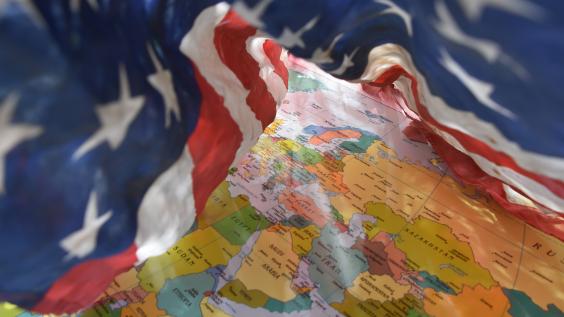U.S. Relations With the Gulf Cooperation Council

Table of Contents
Author(s)
Share this Publication
- Download PDF
- Print This Publication
- Cite This Publication Copy Citation
Coates Ulrichsen, Kristian. 2016. U.S. Relations with the Gulf Cooperation Council. Policy Brief: Recommendations for the New Administration. Rice University’s Baker Institute for Public Policy, Houston, Texas.
President Barack Obama leaves his successor a mixed legacy when it comes to political and strategic relations with the six states of the Gulf Cooperation Council (GCC).1 Institutional links between the United States and the GCC deepened considerably during Obama’s two terms in office. However, President Trump will have to rebuild ties of trust with ruling elites in the Persian Gulf states shaken by U.S. policy toward the Arab uprisings in 2011, the civil war in Syria, and, not least, by the nuclear negotiations with Iran. From a U.S. perspective, the administration that enters office in January 2017 also will need to manage carefully a set of partnerships with key states intent on pursuing regionally assertive policies in Yemen, Egypt, and Libya.
Greater Institutionalization
The GCC lacks an integrative decision-making structure for the pooling of sovereignty, and difficulty in reaching consensus has undermined attempts to align policies on internal and external issues. Robust bilateralism hindered GCC-wide coordination on issues ranging from trade and investment to defense cooperation, and interoperability as member-states (and their international partners) was often negotiated bilaterally rather than through the GCC as a bloc. Saudi officials expressed strong displeasure when Bahrain and Oman “broke ranks” to sign individual Free Trade Agreements (FTAs) with the United States in 2004 and 2006, respectively, as the George W. Bush presidency showed a preference to deal bilaterally with its partners in the GCC.
The Obama administration has instead made concerted efforts to engage (and coordinate policy) with the GCC as a bloc, particularly on defense and security policy:
- A GCC-U.S. Strategic Cooperation Forum was created on March 31, 2012, and ministerial meetings have since been held annually.
- The September 2013 meeting of the Strategic Cooperation Forum saw the formation of a joint US-GCC Security Committee to address issues related to counter-terrorism and border security.
- In December 2013, Obama issued a presidential determination making it possible for the first time to sell arms to the GCC as a bloc.
- Two heads of state summits were held at Camp David in May 2015 and in Riyadh in April 2016, although policymakers from both the U.S. and the GCC have expressed frustration at the lack of tangible follow-up from each of the meetings.
...But Multiple Flashpoints
Many in GCC states will not be sorry to see Obama leave office. US-Gulf relations have come under significant strain since 2011 by the general incomprehension of ruling elites in the Gulf at the administration’s approach to regional affairs. GCC officials interpreted the so-called “pivot to Asia” to imply tacit U.S. abandonment of their interests just as U.S. outreach to Iran reinforced such perceptions. For the first time since the U.S. became directly involved in regional security structures in the Persian Gulf in the 1980s, policymakers in GCC states no longer felt assured of U.S. backing:
- U.S. policy responses to the Arab Spring caused anger among many officials in the Gulf at the withdrawal of support from a longstanding political ally in Egypt and initial calls on the Bahraini ruling family to reform.
- Subsequent inaction in Syria, readiness to work with Muslim Brotherhood-led governments in Tunisia and Egypt in 2012, and diplomatic outreach to Iran contributed further to Gulf unease toward U.S. responses to the Arab Spring.
- An in-depth March 2016 profile of the “Obama Doctrine” in The Atlantic elicited a furious response in the Gulf at the president’s reference to “free-riders,” which many felt was aimed primarily at them.
Looking to the Future
Two major points of friction in the US-GCC relationship appear set to outlast the Obama administration’s remaining time in office. The most visceral is the U.S. outreach to Iran that has taken place since 2013:
- Saudi officials expressed anger at the fact that initial U.S. negotiations with Iran were kept secret from them for nearly two years and that they were not subsequently involved in the international negotiating process in Geneva.
- The Joint Comprehensive Plan of Action reached in July 2015 exposed very different views of the Iranian “threat,” which, for Gulf policymakers, lay not in Tehran’s nuclear program but in Iran’s support for militant non-state actors such as Hezbollah and, recently, Houthi rebels in Yemen.
Gulf-led military operations in Yemen may also elicit rising U.S. unease should the campaign there continue indefinitely and without clear political resolution. The conflict in Yemen highlighted the new assertiveness in GCC policies as the Gulf states acted collectively in a bid to secure their interests:
- It constituted an important evolution in regional security structures as the locus of decision-making lay in Gulf capitals rather than external partners in Washington, DC, or elsewhere.
- The Yemen operation also marked the first use of the joint military command that was launched by the GCC in December 2014, alongside joint naval and police forces created at the same time.
While the U.S. has provided intelligence and targeting support to coalition forces, American political and military officials have expressed concern that the Yemen operations have diverted Gulf attention away from the coalition against the Islamic State in Iraq and Syria, and deepened the vacuum of authority that has opened up spaces for Al Qaeda in the Arabian Peninsula to exploit in eastern Yemen.
The challenge for the Trump administration is to ensure that longstanding political and security relationships with the Gulf states survive temporary recent setbacks in an environment in which GCC officials pursue hawkish regional agendas that prioritize their own security and strategic interests that may not always align with those of the US. Gulf policymakers do not, however, possess a viable alternative to the US-led security guarantee that underpins the regional security architecture, and are unlikely to develop one during the next presidential cycle. The new administration therefore should continue to coordinate with the GCC in security policy but expect to come under pressure from Gulf officials for accelerated arms sales and expedited approval in Congress.
This material may be quoted or reproduced without prior permission, provided appropriate credit is given to the author and Rice University’s Baker Institute for Public Policy. The views expressed herein are those of the individual author(s), and do not necessarily represent the views of Rice University’s Baker Institute for Public Policy.



